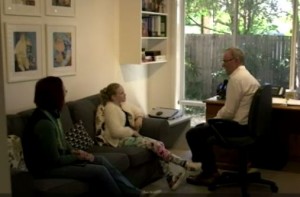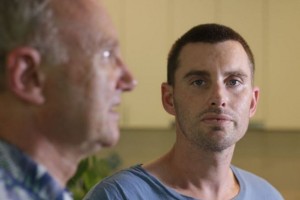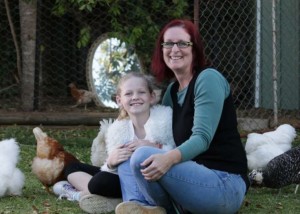'Aspie' diagnosis of son slipped past world expert Tony Attwood: your response
Posted on
The much-lauded series Australian Story has a reputation for offering deep insight into those it profiles.
That guaranteed Australia’s autism community would be watching in big numbers when the show explored the life of world-renowned clinical psychologist Professor Tony Attwood, who is credited with writing the “bible” on Asperger’s syndrome.
Startling was Professor Attwood’s candour when discussing son Will, who had a drug addiction and spent time in jail.
The real surprise, however, was Professor Attwood telling how he had missed something so significant about Will for the first 35 years of his son’s life _ an Asperger’s diagnosis.
Following is an ABC report on the Australian Story episode. We then look at the response of some who viewed it.
How did a world expert in autism miss a diagnosis right under his nose?
That’s the question that Professor Tony Attwood still mulls over and deeply regrets.
The clinical psychologist is recognised as a leading authority in the diagnosis and management of Asperger’s syndrome.
But all his skills and research couldn’t help his son Will.
It was only when the 35-year-old ended up with an overwhelming drug addiction and in jail for burglary that Professor Attwood had a sudden insight.
Professor had difficulty connecting with son
While watching family videos of himself and Will as a four-year-old, Professor Attwood noticed an inability to connect with him.
Many have since wondered how a world expert on Asperger’s could overlook a diagnosis so close to home.
But as Professor Attwood points out, the condition hadn’t even been given a name back in Will’s childhood.
He fell into the same trap that has plagued parents for years.”We just thought he was a naughty, ADHD, difficult, emotional kid.”
Autism a gift not something to be ‘fixed’
Professor Attwood runs his clinic from underneath his house on the outskirts of Brisbane. Such is the demand for his skills, his waiting list is fully booked well into the future.
He’s been researching autism for nearly four decades and is credited with writing “the bible” on Asperger’s syndrome.
Asperger’s, also known as high-functioning autism, is where the brain is wired differently in terms of perceiving, thinking, learning, and relating to the world.
“I was trying to interact with him, but even at the age of four, there was a barrier,” Professor Attwood said.
“[My daughter] Rosie is a teacher of kids with autism and we just turned to each other and said, ‘He’s Asperger’s’!”
Having grown up with a stepfather who was on the spectrum, Professor Attwood said he learnt to speak the language of those with Asperger’s syndrome — or “Aspies” as they call themselves.
“I describe myself as a translator between two different cultures — to explain the neurotypical world to the Aspie and the Aspie world to neurotypical,” he said.
The University of Queensland adjunct professor is credited with revolutionising the approach to Asperger’s syndrome.
Clinical colleague, Dr Michelle Garnett, says he was the first psychologist in the world to see Asperger’s syndrome as a gift and not as something to be “fixed”.
“It’s something to be congratulated for, something to be enjoyed in the person’s life, and we always look for those gifts, those strengths and abilities that the person has because they’re always there,” Dr Garnett said.
The skill in finding a special talent
Professor Attwood’s patients say his skill lies in his ability to connect with them, find their special talent and harness it to help them to reach their potential and lead a fulfilling life.
He believes the intense focus on a special interest shown by people with Asperger’s has led to some of the world’s greatest achievements.
“I think many of the heroes in life, and the greatest scientists and artists, actually have Asperger’s syndrome,” Professor Attwood said.
‘I don’t hold it against him’
It’s with deep sadness that Professor Attwood reflects on his inability to help Will find that special talent when he was a child.
“In hindsight, there are things that I’d have liked to have focussed more on in terms of helping him cope with his intense emotions, but sometimes, as a parent, it’s hard to be objective in that situation,” he said.
Will’s mother, Sarah Attwood, believes the sort of early intervention programs that her husband now recommends for his patients would have helped Will.
“Nowadays, we would have taught him how to manage his frustration … to sort of self-soothe and stay calm,” Ms Attwood said.
“He may even have avoided the drug path, who knows, we’ll never know.”
Will Attwood doesn’t hold his father responsible
“I don’t hold it against him in any way, shape or form for failing to diagnose me,” Mr Attwood said.
“It seems to me, for whatever reason, that my Asperger’s was less pronounced when I was a child.”
Asperger’s the ‘next stage of evolution’?
With at least one in every 100 children being diagnosed on the spectrum, Professor Attwood wonders if Asperger’s may be the next stage of evolution.
He believes the human race needs out-of-the box thinkers to solve the world’s big problems.
“I think in the future some of our major problems, whether it be pollution, electricity or whatever, will be solved by people with Asperger’s,” he said.
“I think we need to embrace and encourage their particular abilities because our future is based on such individuals. And in a way, is Asperger’s syndrome the next stage of human evolution?”
Australian Story’s ‘Found in Translation’ airs Monday 8pm on ABC TV and ABC iview.
Viewer Comments:
Rebecca: “Love Tony Atwood however wished the program had covered more of what the real struggles of living with ASD are on the child and parents. It was such a lost opportunity to educate the general public about what autism is (and how big the spectrum is).There are thousands of parents in Australia at breaking point caring for their children with ASD. This program only added to our struggle to help our kids be understood. Eg. It’s no big deal, Tony’s son had it and he didn’t even realise, it’s a gift. I love highlighting the positives of ASD however this audience was the general public many of whom are confused about what autism is. I encouraged my whole family to watch this show, hoping it would increase their understanding of our 2 kids. Unfortunately I regret that decision. I’ve contacted Australian Story with my thoughts. I’ve asked them to do another program focusing on what ASD is. I encouraged them to use their platform to make a difference”.
Stephanie: “When are Australian Story going to start focusing on autistic people? Not their NT parents.
How about Jeanette Purkis to start with?”
Judanne: “Loved it! Inspirational”.
Ruth: “Such an honest story and I thank Tony and his family for telling it so publicly and sharing some of the emotions. Beautifully told ABC.”
Katherine: “The program was about Tony Attwood’s story, not about living with an ASD child. And I think given his son’s outcomes & issues it very clear that it’s hard for parents and siblings”.
Kalie: “Do have a lot of respect for Tony Attwood. Not sure I support his romantic theroy though that ASD or the now defunct Asperger’s diax as many still say, being a new step in human in evolution. To me it’s pretty clear ASD has always been an important part of evolution”.
Carole (on Yellow Ladybugs): “Who has decided that Asperger’s is high functioning autism? This is what this video is saying. I don’t accept the categorisation of high and low functioning autism and am surprised others don’t have a problem with this video if we are to embrace all autistics”.
Elizabeth: “The program was the tip of the iceberg. Suggestion from a friend, it needs to be a series. Tony has so much to offer”.
Brian: “I‘m in my 70s. No official diagnosis, and probably won’t get one as the cost of approx. $8,000 for all of the diagnostic tests is prohibitive for someone on a pension. For many Aspies, especially older Aspies, self diagnosis is the road most travelled. We know that we are different – we have always known that – but without any diagnosis or understanding of the condition, many of us have lived lives controlled by ‘special interests’, or as I refer to them, My ‘Projects’. I worked as a support worker in the disability sector for about ten years. Many of my clients were ASD, ranging from Asperger’s through to Non-verbal Autism. Despite this experience and the training provided, I failed to recognise the traits that I possessed, although it does explain to some extent, why I was able to develop good relationships with my ASD clients”.



